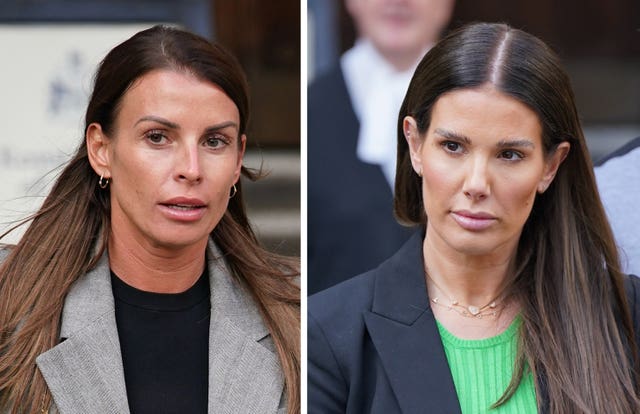Rebekah Vardy’s decision to trademark the phrase “Wagatha Christie” may have been made out of a “fear” that Coleen Rooney would profit from its use, a brand protection expert has suggested.
Mrs Vardy may be looking to “ride on the back” of the publicity from her high-profile and costly legal battle last year and “make some money” from any merchandise using the phrase.
On Wednesday, Saphia Maxamed, owner of London Entertainment, confirmed to the PA news agency that her firm had registered “Wagatha Christie” as a trademark on behalf of its client, Mrs Vardy.
The decision has raised questions over how productions and upcoming documentaries will be affected if they use the phrase.

Producers of the “verbatim” stage play Vardy v Rooney: The Wagatha Christie Trial confirmed the show will go on, despite the trademark registration.
Charlotte Duly, head of brand protection at Charles Russell Speechlys, said that despite Mrs Vardy now having the power to stop the phrase being used in productions, such legal action may produce more negative press and incur further cost.
She suggested the trademark may be an attempt to benefit from potential “commercialisation” stemming from public interest around the trial and act as an “insurance policy”.
Speaking to PA, Ms Duly said: “You wonder why she doesn’t let it go away. It’s not been a great episode for her has it?
“But it might be (a) control thing, it might be a fear of Coleen bringing out a range of goods and services that are branded and maybe stop her rather than to make any profit from it.
“There’s been a massive media frenzy … that tends to create sufficient interest that people might want a T-shirt, for example, or a mug that says ‘Wagatha Christie’.”
Ms Duly noted there was significant reference to fashion in Mrs Vardy’s trademark registration as well as some “slightly strange things” including household sanitisers and mincing machines.
“There’s all kinds of cosmetics, dolls’ clothes … there’s loads of cosmetics bags and … fashion jewellery,” she said.
“I just wonder if it’s more sort of riding on the back of that publicity – people have been quite engaged with it and have found it entertaining.
“Perhaps it’s that sort of element of it where there is some value instead… so make some money.
“It could be getting in there before someone else does and trying to have that control.
“Maybe there’s no intention to use it, maybe it’s a fear that somebody else will start using it so it’s a way of trying to shut it down.”
OMG Babe, new Wagatha artwork just dropped 📸💅 got your tickets yet? Don’t miss the trial live on stage from 6 April!
🎟https://t.co/f0gIgQN2Yn🎟 pic.twitter.com/Pltv9DQMXO
— wagathaplay (@wagathaplay) March 23, 2023
Ms Duly said the trademark was a “great right” for Mrs Vardy to have as others looking to use the phrase for goods and services would be at risk of trademark infringement.
She also noted that the phrase was only trademarked in the United Kingdom, making it “very much a UK issue”.
The phrase “Wagatha Christie” was coined after Mrs Rooney, wife of former Manchester United and England captain Wayne Rooney, accused Mrs Vardy of leaking “false stories” about her private life to the press in a viral social media post in October 2019.
The phrase is a combination of “wag” – an acronym for “wives and girlfriends” commonly given to footballers’ partners – and the name of whodunnit writer Agatha Christie, because of the steps Mrs Rooney took to probe the source of the leaks.
Mrs Vardy subsequently took Mrs Rooney to the High Court for a libel battle but a judge found that the latter’s post was “substantially true”.
Representatives for Mrs Vardy and Mrs Rooney have been contacted for comment.
